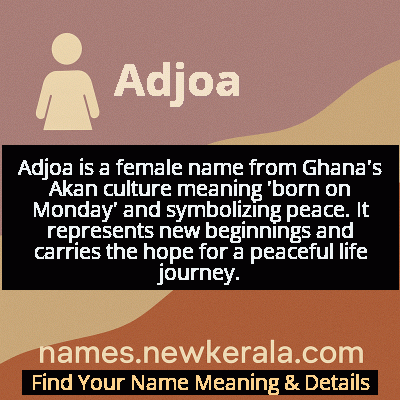Adjoa Name Meaning & Details
Origin, Popularity, Numerology Analysis & Name Meaning of Adjoa
Discover the origin, meaning, and cultural significance of the name ADJOA. Delve into its historical roots and explore the lasting impact it has had on communities and traditions.
Name
Adjoa
Gender
Female
Origin
African
Lucky Number
4
Meaning of the Name - Adjoa
Adjoa is a female name from Ghana's Akan culture meaning 'born on Monday' and symbolizing peace. It represents new beginnings and carries the hope for a peaceful life journey.
Adjoa - Complete Numerology Analysis
Your Numerology Number
Based on Pythagorean Numerology System
Ruling Planet
Uranus (Rahu)
Positive Nature
Strong sense of order, loyal, practical, and disciplined.
Negative Traits
Stubborn, overly serious, rigid, and prone to feeling restricted.
Lucky Colours
Blue, gray.
Lucky Days
Saturday.
Lucky Stones
Blue sapphire.
Harmony Numbers
1, 7, 8.
Best Suited Professions
Managers, engineers, accountants, organizers.
What People Like About You
Dependability, discipline, practicality.
Famous People Named Adjoa
Adjoa Andoh
Actress
British actress known for roles in 'Bridgerton' and extensive theater work with the Royal Shakespeare Company
Adjoa Bayor
Footballer
Ghanaian women's football captain who led the national team to multiple African Women's Championships
Adjoa Skinner
Academic
Psychology professor and researcher focusing on health disparities and cultural factors in mental health
Adjoa A. Aiyetoro
Legal Scholar
Professor and civil rights attorney specializing in racial justice and human rights law
Name Variations & International Equivalents
Click on blue names to explore their detailed meanings. Gray names with will be available soon.
Cultural & Historical Significance
Historically, this system helped maintain cultural identity and social structure, with names serving as markers of lineage, community belonging, and spiritual connection. The name embodies the Akan philosophical concept that individuals carry the essence of their birth day throughout life, influencing their personality and life path. This tradition has been preserved through generations, even among diaspora communities, serving as a vital link to Akan heritage and cultural continuity. The name represents not just individual identity but collective memory and the transmission of cultural values across time and space.
Extended Personality Analysis
Women named Adjoa are often associated with calm, diplomatic personalities that reflect the name's meaning of peace. They typically exhibit natural leadership qualities combined with a gentle approach to conflict resolution, making them excellent mediators in both personal and professional settings. Their Monday birth association suggests characteristics of new beginnings, adaptability, and the ability to initiate projects with fresh energy and optimism.
Many Adjoas demonstrate strong intuitive abilities and emotional intelligence, allowing them to navigate complex social situations with grace and understanding. They often possess a quiet strength that enables them to persevere through challenges while maintaining their composure. The peace-oriented nature of the name suggests individuals who value harmony in relationships and environments, often serving as stabilizing forces in their families and communities. Their combination of diplomatic skills and inner resilience makes them particularly effective in roles requiring patience, negotiation, and long-term vision, embodying the peaceful strength that the name represents.
Modern Usage & Popularity
In contemporary times, Adjoa maintains strong popularity in Ghana and among the global African diaspora as both a connection to cultural roots and a distinctive given name. The name has seen increased international recognition through prominent figures in entertainment, sports, and academia who bear the name. While it remains most common in Ghanaian communities, globalization and cultural exchange have introduced Adjoa to broader audiences. Modern parents often choose the name for its cultural significance, melodic sound, and positive meaning of peace. The name appears in birth registries across North America, Europe, and other regions with significant African diaspora populations, though it remains relatively rare outside these communities. Digital platforms and social media have also contributed to the name's visibility, with many younger Adjoas sharing their cultural heritage online and helping to preserve this traditional naming practice in modern contexts.
Symbolic & Spiritual Meanings
Symbolically, Adjoa represents the concept of peaceful beginnings and the calm that follows turmoil, much like the quiet of Monday morning after a busy weekend. The name embodies the moon's gentle influence (associated with Monday in many cultures) and the feminine principle of nurturing peace. It symbolizes diplomatic resolution, emotional balance, and the ability to bridge differences through understanding rather than confrontation. In metaphorical terms, Adjoa represents the calm center in life's storms, the peacemaker who heals divisions, and the quiet strength that underpins lasting change. The name carries connotations of renewal and fresh starts, reflecting the cyclical nature of weeks and the opportunity each Monday brings for new beginnings. It symbolizes the integration of traditional wisdom with contemporary life, serving as a living connection between ancestral traditions and modern identity while embodying the universal human aspiration for peace and harmony.

